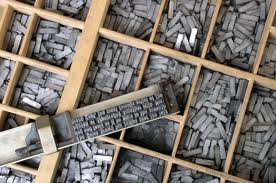I once took a course called “Bibliographical Research and Documentation” which sounds about as boring as any course could possibly be. But it included one of the most profound lessons I’ve ever learned about writing and perfectionism.
Our professor, Father Leland, (both Priest and scholar) was trying to impress upon us the near impossibility of accuracy in the transmission of text. To do so, he sent us to the basement of one of the oldest buildings on campus which housed an even older printing press. It was a behemoth, massive and intimidating, a mechanical beast that looked to me like it might cause some unfortunate mangling of limbs. There were large wooden trays divided into sections that were in turn full of  “sorts,” single iron letters. For the most part, they were organized alphabetically but it was clear a few letters had been thrown into the wrong boxes. Father Leland demonstrated how to insert the sorts into forms. Text for a printing press is assembled in mirror image, making the process even more prone to error. We saw precisely how the page was assembled, piece by piece, letter by letter. And incidentally, we learned the origin of the phrase, “mind your p’s and q’s,” which look identical when inserted backwards and are easily mixed up in the trays. Once printed, the mistake is noticeable, especially if the font has a serif.
“sorts,” single iron letters. For the most part, they were organized alphabetically but it was clear a few letters had been thrown into the wrong boxes. Father Leland demonstrated how to insert the sorts into forms. Text for a printing press is assembled in mirror image, making the process even more prone to error. We saw precisely how the page was assembled, piece by piece, letter by letter. And incidentally, we learned the origin of the phrase, “mind your p’s and q’s,” which look identical when inserted backwards and are easily mixed up in the trays. Once printed, the mistake is noticeable, especially if the font has a serif.
It had been hard enough to achieve accuracy, said Father Leland, when monks were copying text for hours by candlelight in the Monastery and trying to decipher each other’s cursive writing. These scribes could misread a handwritten word, skip something by accident, or write something twice. The printing press was a revolution for all the obvious reasons, but also created new possibilities for error. It was easy to change the word “from” to “form,” “or” to “on,” or even “god” to “dog.” And how might those simple errors change meaning and interpretation? God to dog could be a particularly juicy slip.
To prove the point, we were told to reproduce a paragraph of text, any paragraph. The assignment would be finished when we had printed one correct copy.
I chose the last paragraph from one of my favourite novels at the time, F. Scott Fitzgerald’s The Great Gatsby. It took hours for me to set it properly. When it was finally correct, I felt so proud that I inked the press with gold and printed the paragraph on a bright yellow card stock. It was glorious to get it right, but what a process.
I wish I could find this yellow sheet of card stock now, the text vivid and practically glowing. If I could, I would frame it and send a thanks to Father Leland. But this story is the best I can do; Father Leland died in 2005 and, after thirty years, I have lost track of the physical object that resulted from his lesson.
We writers attempt this near impossible task of accurately transmitting our thoughts. We hope that mistakes have not been made, knowing they have. We hope that our meaning is clear, knowing that every reader will bring nuance we had not imagined to the text and the meaning will change. We write knowing so much is beyond our control. Try as we might, the p’s and q’s get mixed up. Now I have a computer, a spell checker, the internet. But mistakes are still made, just like they always have been.
It seems no coincidence that I chose the last paragraph of Gatsby for this assignment. In the immortal words of Fitzgerald, “So we beat on, boats against the current, borne back ceaselessly into the past.”

